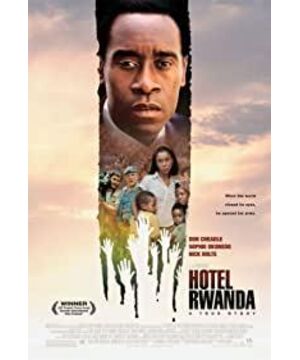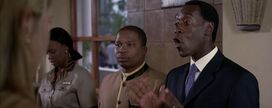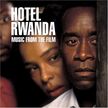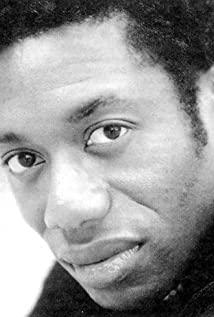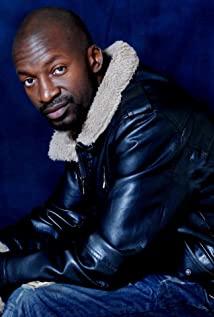I watched this movie in one go. It was 116 minutes long, suitable in length and compact in plot. The first 20 minutes have been laying the groundwork, one scene after another, and the transition is relatively fast. Each scene is deeply meaningful and sets the stage for the subsequent political events. At the beginning, a cargo box accidentally dropped and scattered with knives full of knives to imply that the Hutu fanatics were about to move, and the danger was approaching like black clouds on the horizon. Then the picture turned around, and the signs of danger began to appear in the streets where the Hutu tribe paraded. On that restless night, the innocent neighbor was taken away by the Hutu and fisted. The Hutu showed a brutal and cruel side. At this time, the danger was fully revealed. Then Paul's brother-in-law revealed to him the words of a Hutu friend, and finally Hutu fanatics began to burn, kill, and looting in a small area-an irretrievable beginning.
This short 20 minutes will also make the original image of the actor, the manager of the Rwanda Hotel, Paul full. In the above scene, Paul always pursued the "policy of appeasement," seeing a box full of knives, knowing that the purchase merchants he had been cooperating with all the year round were doing arms smuggling, and he supported Hutu fanatics, but chose to remain silent; he was surrounded by the parade. , But only wanted to get away from this place of right and wrong; watching the innocent neighbor being taken away, he said to his wife: "He is not our family, only the family is important."; Facing the brother-in-law’s disclosure, Paul advised. He: "He asked you to go quickly, just wanting your job." What a familiar behavior we see in history books and in real life, this may be human nature, why is it not the weakness and ugliness of human nature? Paul originally had the opportunity to truly protect his family again and again, and even if he could not stop it, he could take precautions against subsequent political incidents, and save more lives, so that he would not need to double the heavy price to make up for it later.
But, is Paul more than one? Their people, their reporters, and even the president and the UN peacekeeping force are all above it. In those 20 minutes, there was a shot of the two young girls in the lobby of the hotel. One of them was a Tutsi and the other was a Hutu. The danger appeared, but they were able to sing and dance to live in peace and coexist peacefully. Some people said it was. Their sincere friendship, and I feel a kind of slowness in the warm water. At first glance, their reporters thought they were concerned about the suffering of the local people. Later, when they stared at the images of the massacre intently, their hands trembled uncontrollably with excitement, and their voices became loud with excitement. They eagerly contacted the announcer. When this video became a news headline, I suddenly realized that, in their eyes, it was just excellent material, but a tool for their reputation, how ironic. The President blindly pursued reconciliation, deliberately or unintentionally, to reduce the severity of the situation. And the words of the UN peacekeeping force are also quite intriguing: "We are just maintaining peace, not creating peace."
This short 20 minutes contains so much content. Every sentence and every move is not wasted. It is worth watching repeatedly and digging deeply. This 20-minute streamlining is in place, which is admirable.
Paul's transformation began when he learned that the West had a deep contempt for blacks and Africa. The Belgian reinforcements of the peacekeeping force only took away Westerners, whites. Paul gave his enlightenment at that moment. For many years he grew up in a beautiful society under the control of Western countries. The penetration of Western culture can be seen everywhere in him. He drinks whiskey, takes pride in smoking 10,000 francs cigars, and even swears to the death to defend Western transnationalism. Under the company, the Rwanda Hotel is decent and distinguished. He was deeply influenced by Western values, and he worked hard to move closer to them. One day his "God" told him that he was just a dog of his, and he came to his senses and began to defend his people and raise his land, instead of separating himself from the poor and inferior people as before. Here, there is only the Rwanda Hotel in his eyes-the restaurant they call him to manage, and there is no African land under his feet.
Therefore, the content of this movie is more comprehensive. The bloody cruelty of Hutu fanatics and the later humanistic care are not the only focus. On the contrary, the interests behind it are intertwined. The hidden needles in Mianli are shown vividly from beginning to end, hiding in the dark. The enemy at the place makes people's spine chill even more. From this point of view, the film is quite deep.
Paul's actor's acting skills are remarkable. The movies mostly use mid-range shots to focus the audience's attention on Paul's face and portray his expression. Especially in the first 20 minutes, Paul's self-interested indifference can be seen in many places, with low-down eyes and cold face, revealing selfishness and fear. From time to time, he appeared in front of the soldier leader and the merchandiser in a pleasing manner. Later, the self-deprecating after awakening, reveals deep pain and frustration...
Late awakening, belated rescue, whether it is Paul, the captain of the peacekeeping force, from maintaining peace to creating peace , After a few beats, the irreparable in the middle, will it become their lifelong guilt? However, this is human nature.
View more about Hotel Rwanda reviews


